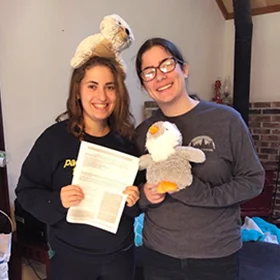Princeton Hillel launches Shabbat Wellness Initiative to support students during coronavirus

The Princeton University Hillel: Center for Jewish Life launched a new Shabbat Wellness Initiative this fall to help students deal with the impact of the coronavirus pandemic on their mental health. This initiative has already connected and supported Princeton students as they embark on this unprecedented semester of online learning.
Aleeza Schoenberg, 21, Hadar Halivni, 20, and James Packman, 21, have spearheaded this initiative with the support of Marni Blitz, associate director of Princeton Hillel.
After Blitz met with Princeton UMatter, a group dedicated to supporting students’ health, she encouraged the students to take their original idea of planning a Shabbat based only on mental health and expand it to cover the seven dimensions of wellness included on UMatter’s Wellness Wheel and Assessment: emotional, environmental, intellectual, occupational, physical, social and spiritual.
The students hoped that planning activities based on the intersection of mental health and Judaism would make the content more relatable.
“Connecting mental health to Judaism and Shabbat is an extra way to make Shabbat more meaningful, relevant and easier for Jews to connect,” Halivni said. “Also, it’s just a new way to look at Shabbat as a time to reflect and recharge.”
Schoenberg, Halivni and Packman compiled weekly source sheets that each correspond to one dimension of wellness. The source sheets include selections from the Torah and other Jewish texts alongside secular sources like song lyrics and YouTube clips. The source sheets end with a UMatter self-assessment and practical tips for improving that area of wellness.
Program participants go through the source sheet and complete the readings and activities asynchronously, and they each decide how much time to devote to the project. They also have a WhatsApp group to talk about the program together.
“It’s self-directed. You do as much as you feel comfortable with,” Packman said. “We want to provide a way for people to feel better and to encourage them to take care of themselves without feeling like they’re obligated to.”
The Hillel sends a hard copy of the source sheet and small gifts to the approximately 15 students and community members who registered in the beginning of the semester, but all students are welcome to participate.
Jamie Rosen, 20, one of the regular participants in the Shabbat Wellness Initiative, has enjoyed learning about Jewish views on wellness. She also expressed her appreciation for the gifts that Princeton Hillel sends to participants, which have ranged from a stuffed animal to a stress ball.
“The first time I got a care package I couldn’t even process for 10 minutes. I realized my Hillel cares about how I’m doing, even when I’m not there,” Rosen said.
Blitz believes that the initiative is a low-stakes program that shows students that Princeton Hillel and other campus resources are available to them, no matter where they are this semester. She hopes to repeat the program in future semesters, now with the support of a Princeton TigerWell Seed grant as well as a HillelWell Wellness Micro Grant.
“I think sometimes people are afraid to make changes in their lives focusing on wellness because it’s overwhelming. I think this is an opportunity to take very, very little steps,” she said.
“It’s also providing connection and resources to the resources on campus. So it’s also saying wellness is part of the Princeton community, and whether you are on or off campus, you have access to these resources that you might not know about,” she continued.
The program has also highlighted for Rosen how much Princeton Hillel cares about the student community.
“The Wellness Shabbats really encompass the values of Hillel, and shows that during this time they’re keeping in touch with students, helping them feel balanced in life, caring about how they’re doing, and just in general being a good resource,” she said.
The student leaders hope that the Shabbat Wellness Initiative will remind students of the importance of prioritizing wellness, both in the future and right now.
Schoenberg said, “Even if it’s making people feel a little better right now, that would be enough.”
Naomi Hess is a student at Princeton University.